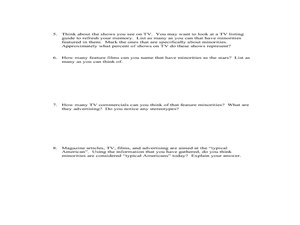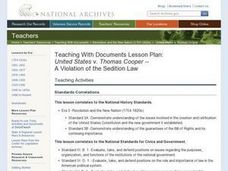Curated OER
Constitution Web-lesson
Students examine multiple sources like america's founders, court cases, headilnes and more to learn about the Constitutional Convention of 1787
University of Arkansas
Assessment and Discussion
"Without concerned citizen action to uphold them (human rights) close to home; we shall look in vain for progress in the larger world. . ." Eleanor Roosevelt's comment is used to set the stage for the conclusion of a five-activity unit...
Curated OER
What Makes a Good Law?
Why were laws created? Spark a group discussion on why we need laws to co-exist. Should the sale of some things be outlawed on Sundays? Read a case summary between Target and the state of Minnesota that debated this issue. Ask your...
San Antonio Independent School District
Breaking Down the Declaration of Independence
Are learners heavy sighing at the idea of reading a primary source, written in a language that is difficult to understand and in cursive? Look no further, because the resource breaks down the Declaration of Independence in an...
Judicial Learning Center
American Equality Milestones
Has equality always existed as an unalienable right in the United States? Use this worksheet to chronicle the history and progression of equality in major documents and speeches throughout American history. The graphic organizer asks...
ProCon
Right to Health Care
Is health care a right or a privilege? Scholars review pro and con arguments to decide if all Americans should have the right to health care. They also watch informative videos and review information on the United States and...
Youth Outreach
Connecting the Separate Powers
Scholars demonstrate what they know about the separation of powers through role play. Two individuals act out a skit as the remaining class members discuss and decide whether the interaction they observed is an appropriate example...
Judicial Learning Center
Your 1st Amendment Rights
Why should classes care about the First Amendment? An engaging lesson serves as a powerful tool for answering just that. As all four cases in the lesson relate directly to freedom of expression in schools, young scholars explore the...
Curated OER
Minorities in Mainstream American Society
So many people fought for Civil Rights in the United States. Read about the Civil Rights Act of 1964, and discuss what the act guarantees. Then pass out a slew of magazines and encourage them to observe how often minorities appear in...
Center for Civic Education
Citizenship Schools and Civic Education During the Civil Rights Movement and in the Present
Your young historians will discover the importance that citizenship education has played in the social progress of the United States as they learn about early efforts to discourage African Americans from voting in the 1960s.
Judicial Learning Center
Your 4th Amendment Rights
Americans love to learn about their rights, especially those that protect them from the government's power to invade their privacy. Young people are especially engaged by this topic. An informative lesson explores four Supreme Court...
Teaching Tolerance
Changing Demographics: What Can We Do to Promote Respect?
America has always been seen as a melting pot to the world. Scholars research the concept of blending cultures in the United States and how it is changing over time. The final lesson of a four-part series analyzes the changing...
ProCon
Gun Control
According to some estimates, there are more guns than people in the United States. Learners decide if America should enact more gun control laws. They analyze information about gun deaths in the United States by year, read about the...
Center for History Education
Women's Rights in the American Century
Today, many young people find it hard to understand why it took over 150 years for women in the United States to get the right to vote—why there was even a need for the suffrage movement. As they read a series of primary source...
Center for History and New Media
The Impact of the Jim Crow Era on Education, 1877–1930s
Even though American slaves were officially emancipated in 1865, the effects of slavery perpetuated throughout the 19th and 20th centuries. Middle and high schoolers learn about the ways that discrimination and the Jim Crow laws...
ProCon
Gay Marriage
The first legal gay marriage in the United States occurred in Massachusetts in 2004. Since then, countless others have tied the knot. Scholars decide whether gay marriage should be legal by reading a history of the issue, analyzing the...
School Improvement in Maryland
Analysis of Marbury v. Madison
Should the United States Supreme Court have the power of judicial review? Instructors guide class members through a review of Marbury v. Madison and assist class members in writing a brief of the case. As independent practice,...
School Improvement in Maryland
Affirmative Action
Do the government's affirmative action policies promote equity in the United States? The Fourteenth Amendment to the US Constitution and affirmative action policies come under scrutiny in an activity that asks class members to...
National Constitution Center
Town Hall Wall: College Exam
The college that directly affects young citizens' lives is not the university they're applying to. Learn about the Electoral College in a town hall activity in which class members debate the merits of the current system versus electing a...
Curated OER
Timeline of Compromises over Slavery
In this primary source analysis learning exercise, students read excerpts of the Preamble, the Constitution, and the Fugitive Slave Act, the Missouri Compromise, the Compromise of 1850, the Kansas-Nebraska Act, and the Crittenden...
Curated OER
United States v. Thomas Cooper --
Students compare the Alien and Sedition Act to the First Amendment. They read and analyze a primary document and write a synopsis. They brainstorm challenges to the Government or President of the US.
Curated OER
Law Day: Constitutional Law Outline
Young scholars receive information about laws. Some of the categories include powers of the federal government, federal powers vs. state powers, and the Bill of Rights. It is in an outline form that looks like the student follows along...
Curated OER
A More Perfect Union: Barack Obama's Race Speech at the National Constitution Center
Eleventh graders explore the process of perfecting the Union through changes made to the Constitution, and through the powers delegated to each branch of government. In this American Government instructional activity, 11th graders...
Curated OER
Rights and Responsibility
Students identify the shortcomings of the Articles of Confederation and explain how these shortcomings lead to the creation of the Constitution. They explain why the Bill of Rights was added to the constitution and identify six freedoms...

























